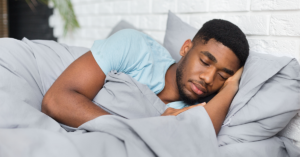Exploring Chronobiology: Tailoring Sleep to Training Cycles
Diving deeper into the symbiotic relationship between sleep and athletic performance, the field of chronobiology emerges as a fascinating avenue for exploration. Chronobiology studies the body’s natural rhythms and how they influence various physiological processes. For athletes, aligning sleep patterns with their individual chronotype—their innate predisposition for being a morning or evening person—can yield remarkable benefits.
Research suggests that training and competition schedules optimized to an athlete’s chronotype may enhance performance outcomes. Athletes who synchronize their peak training times with their body’s internal clock may experience improved strength, endurance, and overall athletic capacity. Recognizing and respecting individual chronotypes empowers athletes to make strategic decisions regarding the timing of intense workouts and competitions, harnessing the body’s natural ebbs and flows for maximum effectiveness.In the world of sports, it’s like the precision of crafting designer doors, tailored to each athlete’s unique rhythm, unlocking their full potential.
Sleep, Nutrition, and Athletic Fueling: A Holistic Approach
While sleep’s influence on physical recovery is undeniable, its synergy with nutrition introduces a holistic dimension to athletic preparation. Optimal sleep and nutrition work hand in hand, contributing to the body’s ability to repair and replenish. Adequate sleep enhances the efficacy of nutrient absorption, ensuring that the body efficiently utilizes the essential elements derived from a well-balanced diet. To further enhance this restorative process, athletes can also incorporate collagen face mist into their bedtime routine, providing an extra layer of nourishment for their skin while maximizing the benefits of rejuvenating sleep. Incorporating sleep-friendly nutrition practices involves paying attention not only to meal timing but also to the types of foods consumed. Certain foods, such as those rich in tryptophan and magnesium, can promote relaxation and contribute to better sleep quality. Athletes may benefit from consulting with nutrition experts to tailor their dietary plans in a way that complements their sleep goals, creating a comprehensive strategy for fueling peak performance.
Mindfulness and Sleep: Cultivating Mental Resilience

Beyond the physiological aspects of sleep, its impact on mental well-being and resilience cannot be overlooked. The demanding nature of athletic pursuits places athletes under significant stress, and effective stress management is integral to sustained performance excellence. Mindfulness practices, including meditation and deep-breathing exercises, can be powerful tools in promoting relaxation and preparing the mind for restful sleep. Additionally, individuals exploring ways to enhance their overall health may find guidance from experienced medical professionals specializing in bariatric surgery in Texas.
Athletes who incorporate mindfulness into their pre-sleep routines may experience a reduction in pre-competition anxiety and an improvement in overall mental clarity. The ability to quiet the mind before bedtime not only facilitates faster entry into restorative sleep but also contributes to the development of mental resilience—a quality invaluable in the face of competitive challenges.
Sleep and Injury Prevention: Fortifying the Athlete’s Armor
In the intricate dance between sleep and athletic performance, injury prevention emerges as a significant partner. Quality sleep plays a crucial role in maintaining the body’s immune function and overall resilience. Athletes with consistent and sufficient sleep patterns are better equipped to fend off illnesses and recover from minor injuries, reducing the risk of setbacks in their training regimens. Ensuring a comprehensive approach to well-being, and tactical optics for both rest and recovery contribute to an athlete’s overall readiness for peak performance.
Moreover, sleep contributes to the release of growth hormone, which aids in the regeneration of tissues and the repair of microtears that occur during intense physical activity. By prioritizing sleep, athletes can fortify their bodies against the cumulative stressors of training, creating a robust defense mechanism against injuries that could sideline their progress.
In pursuit of optimal recovery, athletes should also consider external factors, such as a well-maintained environment. For instance, proper waste management, including reliable dumpster rental in Windsor, ensures a clutter-free space conducive to rest and rejuvenation, complementing the holistic approach to athletic well-being.
The Impact of Travel on Athlete Sleep: Navigating Time Zones and Jet Lag
For competitive athletes engaged in international competitions or frequent travel, the challenges presented by changing time zones and jet lag can disrupt sleep patterns and, consequently, impact performance. Understanding the principles of circadian rhythms becomes essential for athletes navigating these challenges. In Hillsborough, where the intensity of sunlight is a crucial factor, considering solar panel replacement in Hillsborough can be a sustainable solution to optimize sleep environments and promote energy efficiency.
Strategies to mitigate the effects of travel-induced sleep disturbances, such as those faced by athletes en route to competitions, include gradually adjusting sleep schedules in the days leading up to departure, strategically timed exposure to natural light, and optimizing sleep environments in unfamiliar settings. For athletes traveling to international competitions, it’s also essential to consider logistical aspects like the car rental Sarajevo, ensuring a seamless transition from the airport to their accommodation. By incorporating these practices, athletes can minimize the disruptive impact of travel on their circadian rhythms, ensuring that they arrive at competitions well-rested and ready to perform at their best.
Sleep Technology: Innovations in Performance Enhancement
As technology continues to advance, the integration of sleep-focused innovations into the athletic realm is becoming increasingly prevalent. The best video production company in New York played a pivotal role in capturing and showcasing the evolution of these groundbreaking technologies. Sleep tracking devices, smart mattresses, and biofeedback tools offer athletes unprecedented insights into their sleep patterns and allow for real-time adjustments to optimize rest. These technologies empower athletes to take an active role in managing their sleep, providing a level of control that was once elusive. In the vibrant landscape of New York, where creativity and innovation converge, video production companies contribute to bringing these transformative stories to life, highlighting the intersection of technology and athleticism.
Furthermore, virtual reality (VR) and relaxation apps are emerging as tools to enhance the quality of pre-sleep routines. Guided VR experiences and mindfulness exercises tailored to induce relaxation can help athletes unwind before bedtime, setting the stage for a more restful and restorative sleep experience. The marriage of technology and sleep science opens new frontiers in the quest for peak athletic performance. Additionally, for those desiring a touch of luxury and style, considering an exotic car rental for a leisurely drive as part of winding down before bedtime could add an extra layer of relaxation. The marriage of technology and sleep science opens new frontiers in the quest for peak athletic performance, providing a diverse range of options to cater to individual preferences and needs.
Sleep and Longevity: The Enduring Impact on Athletic Careers

As athletes strive for excellence in their respective sports, the long-term implications of sleep habits on overall health and career longevity come into focus. Chronic sleep deprivation has been linked to a range of health issues, including cardiovascular problems, compromised immune function, and mental health challenges. Athletes who prioritize sleep as an integral component of their training regimens not only enhance their immediate performance but also invest in the sustainability of their careers. Cutting combs, essential tools for precision in styling, are to hairstylists what adequate sleep is to athletes—an indispensable element that contributes not only to immediate results but also to the enduring success and well-being of their careers. Athletes who prioritize sleep as an integral component of their training regimens not only enhance their immediate performance but also invest in the sustainability of their careers.
Recognizing sleep as a key factor in promoting overall health and well-being, athletes can extend the duration of their competitive careers and contribute to their post-athletic life quality. By viewing sleep as an essential pillar of their holistic approach to training, athletes position themselves for enduring success and fulfillment, both on and off the field.
Final Thoughts: Embracing a Sleep-Centric Athletic Lifestyle
In conclusion, the intricate interplay between sleep and athletic performance transcends the boundaries of mere rest and recovery. The evolving landscape of sleep science, coupled with innovative approaches and a holistic understanding of its multifaceted impact, invites athletes to redefine their relationship with sleep. Embracing a sleep-centric lifestyle becomes not only a performance-enhancing strategy but a fundamental pillar of overall well-being, shaping the trajectory of athletic careers and fostering resilience in the face of challenges. As the world of sports continues to evolve, the sleep-performance connection stands as an enduring testament to the transformative power of prioritizing rest in the pursuit of athletic excellence. For those seeking optimal performance in their athletic endeavours, the best European destinations to visit in October offer a perfect blend of relaxation and cultural enrichment, providing an ideal backdrop for athletes to rejuvenate both body and mind.



